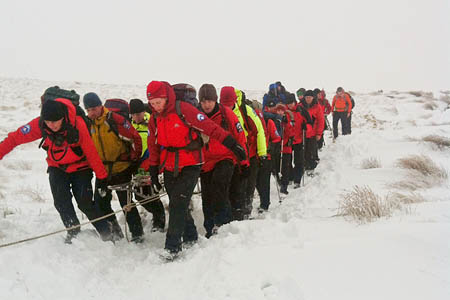A mountain rescue team says anyone without crampons and ice-axe should stay off the high mountains of south Wales in current conditions.
Brecon Mountain Rescue Team made the plea after it was twice called out to Corn Du to help injured walkers.
The team said anyone without winter gear should stick to lower slopes.
As grough reported, the Brecon team was one of three which went to the aid of an injured 34-year-old woman on the 873m (2,864ft) mountain on Saturday.
The following day, the team was called out to the same mountain, along with colleagues from the Central Beacons, Western Beacons and Longtown teams.
A 28-year-old man from Pontyclun, Bridgend, slipped and broke two bones in his lower leg.
A spokesperson for Brecon MRT said: “Difficult weather conditions meant he could not initially be reached by the RAF search and rescue helicopter, from RMB Chivenor, in Devon.
“The rescuers had increasing concerns about the casualty’s condition and fortunately a break in the weather allowed the helicopter to reach the site and airlift the casualty to Prince Charles Hospital, Merthyr Tydfil.”
Mark Jones, deputy team leader of Brecon MRT, said: “The man was very cold when we arrived on scene despite being appropriately equipped for the current wintry conditions.
“We are very grateful to the RAF aircrew who assisted in the evacuation.
“Their excellent flying allowed us to get the casualty to hospital a couple of hours before we could have ourselves.
“Hypothermia is the greater threat with this kind of incident.
“He was treated on the hill by the same mountain rescue doctor and paramedics as the Saturday callout.
“We would call on anyone heading out into the mountains during this cold snap to be properly equipped with crampons, ice-axe or walking poles, warm weather gear, map, compass and torch. If you are unused to high-level walking it may be better to stick to the lower slopes.
“We also strongly advise walkers to carry several layers of spare clothing. While they may not be needed during a walk, in the event of an accident, a casualty could be sitting in the snow and ice for over an hour before search teams reach them.
“These extra clothes will delay the effects of hypothermia and could save a life.”

Ken Rowan
21 January 2013Surely the advice should read, "with crampons and ice-axe" and shouldn't even mention walking poles! In my 30 years walking in the Scottish mountains in winter the ice-axe is the number one item in my kit list! Stop the very bad advice please.
heidi
23 January 2013i see so many walking poles in the mountains and rarely ice axes. i dont know where this has come from but how can you self arrest with poles??
Seth Dunn
30 January 2013Sorry but I had to comment here . Last weekend I was on Fan Brycheiniog in powder snow up to 4 feet deep with an average depth of two and a half feet . I had an ice axe . I had crampons . The crampons never came out of the rucksack , and the ice axe was only used for digging out snow seats to get out of the wind . You cannot self arrest on powder snow and crampons wont get a grip on it .
Walking poles were the only helpful walking aid that I could use .
Being prepared is good , but snow conditions can vary and sometimes poles are actually more useful than an axe .